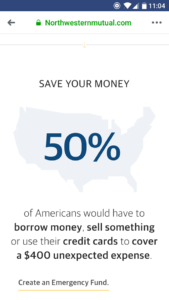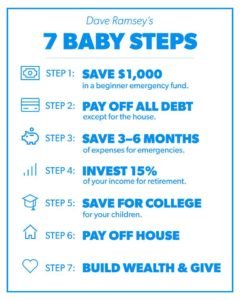

Half of Americans would have to go into debt or sell something in order to cover a $400 unexpected expense. That is financial fragility. It is a precarious and fear-inducing fact. Let's change that!
You can feel financially safe and secure when you are certain your behavior matches the recipe for financial success - spending less money than you make.
First, what's recommended is making a $1000 emergency fund, then tackling getting out of debt.
Dave Ramsey, a financial guru, gives 7 basic steps to get to financial strength and stability. He calls them 7 baby steps.

Sell, Sell, Sell to Get That First $1,000
OfferUp is a great app for selling from home, having a garage sale, selling on eBay (that's how my husband and I got out of debt our first years of marriage. I sold pre-owned designer clothing on eBay.), and one of my personal favorites is selling TO Amazon, not on, but TO. Click here to check it out. So easy to use! Also click here for many more ways to find money to make or save.Once you've got that cash ready, you'll be more prepared for an emergency - Remember wants are not emergencies - the emergency fund is for actual crises and not to be touched for a want.
Paying off debt is possible.
Here's a way of quickly and easily being empowered by drawing up a simple, living budget.
Now that you're debt free, saving 3 - 6 months of your income if you're a single income household, gives you a buffer that prepares you for being laid off and other unexpected financial challenges.
Being debt free and having that 3-6 month buffer allows you that big exhale that says, I am, in great part, a steward of my financial fate.
Confidently Set and Achieve Financial Goals
Winning long term at money doesn't just happen. No matter how high your income, if you don't have a goal or a strategy for keeping that income, you can lose it far more quickly than you might realize. The need to spend less than you make remains, no matter how much or how little your income is.
Often people say they're reluctant to be a "saver" because they equate that with being a "tightwad" or miserly. But no, no, no - when you're broke and deep in debt, it's very hard to give. When you've saved and gotten debt free, that's when you're able to find yourself living and giving like you might only have dreamed.
You've got this! You can win at money!
Practice saying no on a couple things (and here are a bunch of monthly bills you don't even need to say no to, but can get reduced, click here to find out how) and you'll learn, a budget isn't so bad. It can actually be an astonishingly empowering tool that allows you to know what and where you're spending. It can help you prioritize what matters most in your financial life and future and help you GET THERE.
For more money saving ideas:
Be sure to follow us on Facebook by clicking here.
Posted from my blog with SteemPress : https://sixonabudget.com/what-is-financial-fragility-and-how-can-you-be-finanicially-stable-and-resilient/